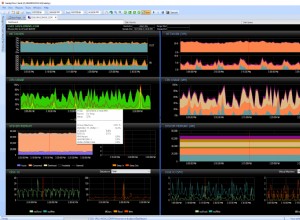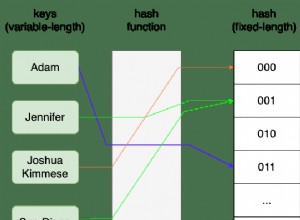Voici un exemple simplifié que j'ai fait pour une question similaire liée aux performances il y a quelque temps qui tire parti des index de clé primaire groupée innodb (évidemment uniquement disponible avec innodb !!)
- https://dev.mysql. com/doc/refman/5.0/en/innodb-index-types.html
- http:/ /www.xaprb.com/blog/2006/07/04/how-to-exploit-mysql-index-optimizations/
Vous disposez de 3 tables :category, product et product_category comme suit :
drop table if exists product;
create table product
(
prod_id int unsigned not null auto_increment primary key,
name varchar(255) not null unique
)
engine = innodb;
drop table if exists category;
create table category
(
cat_id mediumint unsigned not null auto_increment primary key,
name varchar(255) not null unique
)
engine = innodb;
drop table if exists product_category;
create table product_category
(
cat_id mediumint unsigned not null,
prod_id int unsigned not null,
primary key (cat_id, prod_id) -- **note the clustered composite index** !!
)
engine = innodb;
La chose la plus importante est l'ordre de la clé primaire composite groupée product_catgeory car les requêtes typiques pour ce scénario sont toujours dirigées par cat_id =x ou cat_id in (x,y,z...).
Nous avons 500K catégories, 1 million produits et 125 millions catégories de produits.
select count(*) from category;
+----------+
| count(*) |
+----------+
| 500000 |
+----------+
select count(*) from product;
+----------+
| count(*) |
+----------+
| 1000000 |
+----------+
select count(*) from product_category;
+-----------+
| count(*) |
+-----------+
| 125611877 |
+-----------+
Voyons donc comment ce schéma fonctionne pour une requête similaire à la vôtre. Toutes les requêtes sont exécutées à froid (après le redémarrage de mysql) avec des tampons vides et aucune mise en cache des requêtes.
select
p.*
from
product p
inner join product_category pc on
pc.cat_id = 4104 and pc.prod_id = p.prod_id
order by
p.prod_id desc -- sry dont a date field in this sample table - wont make any difference though
limit 20;
+---------+----------------+
| prod_id | name |
+---------+----------------+
| 993561 | Product 993561 |
| 991215 | Product 991215 |
| 989222 | Product 989222 |
| 986589 | Product 986589 |
| 983593 | Product 983593 |
| 982507 | Product 982507 |
| 981505 | Product 981505 |
| 981320 | Product 981320 |
| 978576 | Product 978576 |
| 973428 | Product 973428 |
| 959384 | Product 959384 |
| 954829 | Product 954829 |
| 953369 | Product 953369 |
| 951891 | Product 951891 |
| 949413 | Product 949413 |
| 947855 | Product 947855 |
| 947080 | Product 947080 |
| 945115 | Product 945115 |
| 943833 | Product 943833 |
| 942309 | Product 942309 |
+---------+----------------+
20 rows in set (0.70 sec)
explain
select
p.*
from
product p
inner join product_category pc on
pc.cat_id = 4104 and pc.prod_id = p.prod_id
order by
p.prod_id desc -- sry dont a date field in this sample table - wont make any diference though
limit 20;
+----+-------------+-------+--------+---------------+---------+---------+------------------+------+----------------------------------------------+
| id | select_type | table | type | possible_keys | key | key_len | ref | rows | Extra |
+----+-------------+-------+--------+---------------+---------+---------+------------------+------+----------------------------------------------+
| 1 | SIMPLE | pc | ref | PRIMARY | PRIMARY | 3 | const | 499 | Using index; Using temporary; Using filesort |
| 1 | SIMPLE | p | eq_ref | PRIMARY | PRIMARY | 4 | vl_db.pc.prod_id | 1 | |
+----+-------------+-------+--------+---------------+---------+---------+------------------+------+----------------------------------------------+
2 rows in set (0.00 sec)
C'est donc 0,70 seconde froide - aïe.
J'espère que cela vous aidera :)
MODIFIER
Après avoir lu votre réponse à mon commentaire ci-dessus, il semble que vous ayez l'un des deux choix à faire :
create table articles_to_categories
(
article_id int unsigned not null,
category_id mediumint unsigned not null,
primary key(article_id, category_id), -- good for queries that lead with article_id = x
key (category_id)
)
engine=innodb;
ou.
create table categories_to_articles
(
article_id int unsigned not null,
category_id mediumint unsigned not null,
primary key(category_id, article_id), -- good for queries that lead with category_id = x
key (article_id)
)
engine=innodb;
dépend de votre typique des requêtes sur la façon dont vous définissez votre PK en cluster.




